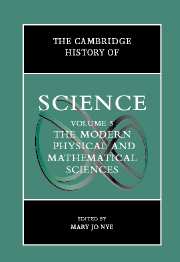Book contents
- Frontmatter
- Introduction: The Modern Physical and Mathematical Sciences
- Part I The Public Cultures of the Physical Sciences After 1800
- 1 Theories of Scientific Method
- 2 Intersections of Physical Science and Western Religion in the Nineteenth and Twentieth Centuries
- 3 A Twisted Tale: Women in the Physical Sciences in the Nineteenth and Twentieth Centuries
- 4 Scientists and Their Publics: Popularization of Science in the Nineteenth Century
- 5 Literature and the Modern Physical Sciences
- Part II Discipline Building in the Sciences: Places, Instruments, Communication
- Part III Chemistry and Physics: Problems Through the Early 1900s
- Part IV Atomic and Molecular Sciences in the Twentieth Century
- Part V Mathematics, Astronomy, and Cosmology Since the Eighteenth Century
- Part VI Problems and Promises at the End of the Twentieth Century
- Index
- References
5 - Literature and the Modern Physical Sciences
from Part I - The Public Cultures of the Physical Sciences After 1800
Published online by Cambridge University Press: 28 March 2008
- Frontmatter
- Introduction: The Modern Physical and Mathematical Sciences
- Part I The Public Cultures of the Physical Sciences After 1800
- 1 Theories of Scientific Method
- 2 Intersections of Physical Science and Western Religion in the Nineteenth and Twentieth Centuries
- 3 A Twisted Tale: Women in the Physical Sciences in the Nineteenth and Twentieth Centuries
- 4 Scientists and Their Publics: Popularization of Science in the Nineteenth Century
- 5 Literature and the Modern Physical Sciences
- Part II Discipline Building in the Sciences: Places, Instruments, Communication
- Part III Chemistry and Physics: Problems Through the Early 1900s
- Part IV Atomic and Molecular Sciences in the Twentieth Century
- Part V Mathematics, Astronomy, and Cosmology Since the Eighteenth Century
- Part VI Problems and Promises at the End of the Twentieth Century
- Index
- References
Summary
Richard Feynman (1918–1988) loved to tell the story of his close encounter with poetry while a graduate student in physics at Princeton. Sitting in on a colloquium in which “somebody” analyzed the structural and emotional elements of a poem, Feynman was set up as an impromptu respondent by the graduate dean, who was confident that the situation would elicit a strong reaction. To the literary scholar’s inquiry, “Isn’t it the same in mathematics …?” Feynman was asked to relate the problem to theoretical physics. He tells us about his reply:
“Yes, it’s very closely related. In theoretical physics, the analog of the word is the mathematical formula, the analog of the structure of the poem is the interrelationship of the theoretical bling-bling with the so-and-so” – and I went through the whole thing, making a perfect analogy. The speaker’s eyes were beaming with happiness.
Then I said, “It seems to me that no matter what you say about poetry, I could find a way of making up an analog with any subject, just as I did for theoretical physics. I don’t consider such analogs meaningful.”
Like other anecdotes in Feynman’s memoirs, this story – in both its enactment and retelling – is framed upon a frequently recurrent motif of clever one-upmanship that displays several constituent characteristics of his psychology and personality. The special notice he takes of the smile he is about to wipe off the speaker’s face participates in the kind of intellectual sadism that Feynman later enjoyed as the perpetrator of elaborate practical jokes, some with near life-and-death consequences.
- Type
- Chapter
- Information
- The Cambridge History of Science , pp. 91 - 110Publisher: Cambridge University PressPrint publication year: 2002
References
- 1
- Cited by



